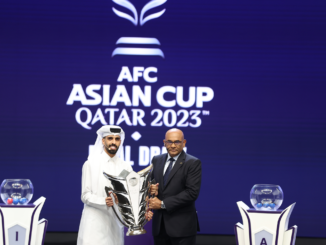
No one really knows what a post COVID-19 world will look like, especially when it comes to sport.
The pandemic has wrought havoc on the sporting landscape in every corner of the globe, and Asia is no exception. The only thing we know for certain is that things will never be the same again.
It’s likely some clubs will fold, unable to survive the months of inaction with no income. Already there are severe doubts hanging over some clubs, with J.League side Sagan Tosu thought to be in critical condition, while even clubs in Saudi Arabia are having the purse strings tightened as they look to survive until some form of normality returns.
But what was the norm pre-COVID-19 won’t, and can’t be, the norm post-COVID-19. The money simply won’t exist to allow for it to happen.
So where does this leave Asia’s showpiece club competition, the AFC Champions League?
Having 32 teams – increasing to 40 from 2021 – criss-crossing the continent for 11 months of the year now seems like an extravagance the AFC and its clubs can ill-afford moving forward.
So what is the answer?
Perhaps the answer lies in history. Before the AFC Champions League in its modern incarnation came into existence there was the annual Asian Club Championship, a smaller, more compact version of the ACL, held in various iterations from 1967 to 2002.
While I’m not calling for a reduction in the number of competing teams, the format of the old ACC does offer a glimpse into what a future ACL competition might look like, with group stages held in central hubs, minimising travel and compacting the group stage into a single week tournament, focusing the attention of Asian football onto the competition.
It’s a solution AFC might have to consider to simply finish this year’s competition given the travel restrictions in place in so many countries.
With five groups of four teams on each side of the continent, hubs could be held in the likes of Tokyo, Bangkok, Seoul, Sydney, Dubai, Doha, Tashkent and so on. While some would argue against the advantage, the hubs would need to be the home city of one of the participating clubs to ensure there are some crowds in attendance.
The AFC could also designate that week as an ACL Match Week, with no other league matches taking place, ensuring the attention of the continent was on the ACL.
While group stages will be reduced to three matches, rather than six, and some clubs will lose out on home gate revenue, the offset is a significantly reduced travel and accommodation bill. Importantly, given the need to tighten purse strings at all levels of the game, it will mean reduced travel subsidies from AFC as teams embark on only one international journey, rather than three.
Less travel will also have a more minimal impact on domestic schedules, with fewer fixtures needing to be rescheduled as the group stage wraps up in one week rather than being spread across a number of months.
A reduced number of games also places a premium on every game. Lose the opening game? The second match becomes a must-win. As it stands, teams can afford to lose (or draw) the opening few matches and still do enough to progress from the group stage. Games need to have an edge, a sense of importance, just like the group stage at the World Cup. Every match has a do-or-die feeling to it.
Completing the group stage in just one week also means AFC can pinpoint an ideal time in the calendar that suits all participating nations. As it stands, the group stage starts before some league’s have even started their season, while others are nearing the completion of their league season. A period in late March or early April would appear to be the sweet spot.
Getting creative with formats for the ACL is something we discussed on the podcast last year, looking at ways to revive a tired format that has, in recent years, proven to be a difficult sell to fans.
A one-week group stage in selected cities gives AFC the chance to create a festival feel around the week, allowing fans to travel knowing they’ll see an entire group stage, and not just one match. It will allow media, especially in the host city, to cover all games and all teams.
You could, like in the ACC, adopt the same ‘hub’ concept for all knockout rounds too, or revert to the current home and away system.
The COVID-19 pandemic has been a disaster for sporting leagues and competitions around the world, but every crisis also presents an opportunity. An opportunity to reset. Necessity is the mother of invention, as they say.
The AFC Champions League is a fantastic competition, but its format was tired and in need of a reboot. The AFC now has the opportunity to do just that and breathe new life into a competition that should be the flagship tournament for Asian football.
Photo: Facebook/AFC Champions League
Listen to Scott and Paul discuss new format ideas for the AFC Champions League on Episode 37 of The Asian Game podcast.




